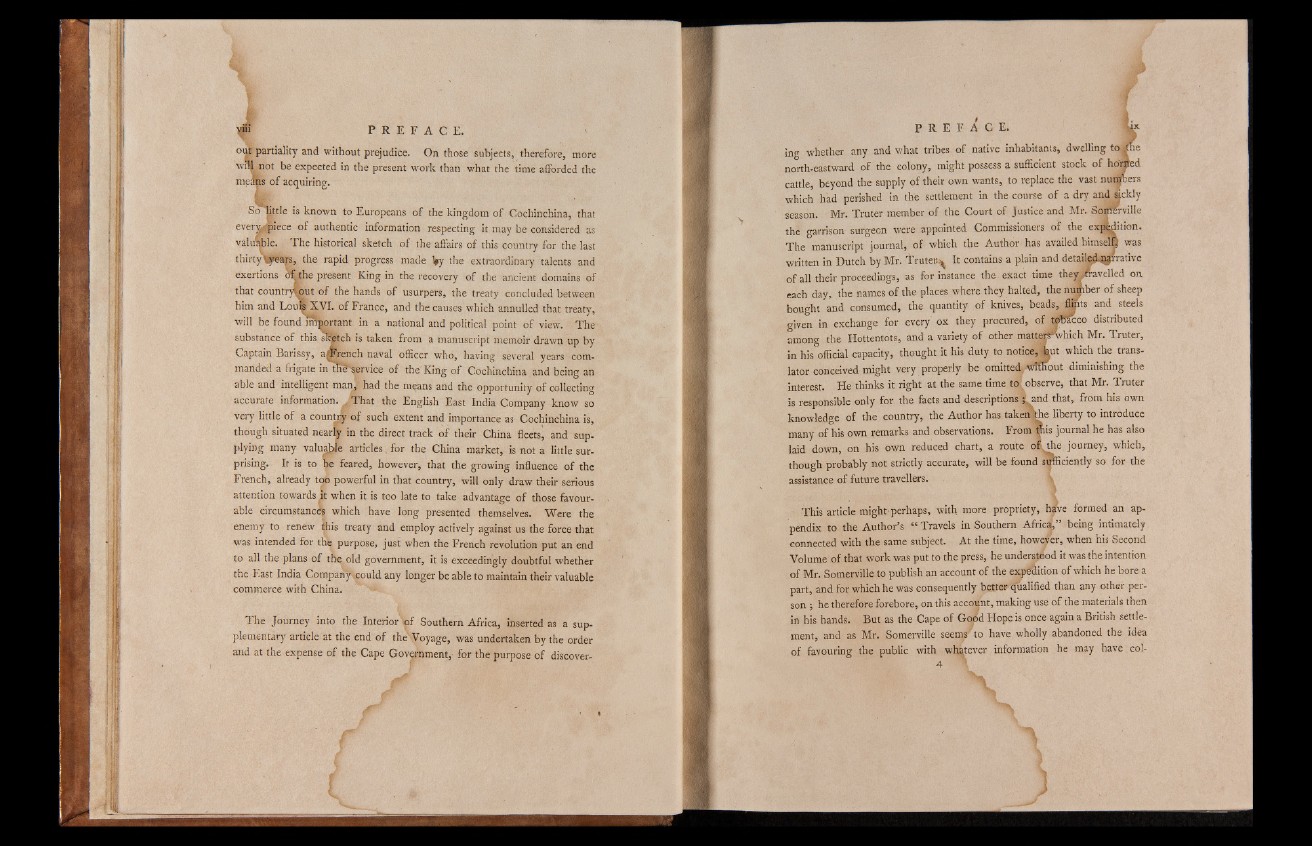
ou| partiality and without prejudice. On those subjects, therefore, more
wf!| not be expected in the present work than what the time afforded the
means of acquiring.
So little is known to Europeans of the kingdom of Cochinchina, that
everw piece of authentic information respecting it may be considered as
valuable. The historical sketch of the affairs of this country for the last
thirtylpeaj'S, the rapid, progress made Ijry the extraordinary talents and
exertions ofj the present King in the recovery of the ancient domains of
that countrytaut of the hands of usurpers, the treaty concluded between
him and Lou$ XVI. of France, and the causes which annulled that treaty,
will be found nflfiortant in a national and political point of view. The
substance of this sketch is taken from a manuscript memoir drawn up by
Captain Barissy, aprench naval officer who, having several years commanded
a frigate in tfe*service of the King of Cochinchina and being an
able and intelligent man, had the means and the opportunity of collecting
accurate information.That the English East India Company know so
very little of a country of such extent and importance as Cochinchina is,
though situated nearly in the direct track o f their China fleets) and supplying
many valuable articles, for the China market, is not a little surprising.
It is to be feared, however, that the growing influence of the
French, already too powerful in that country, will only draw their serious
attention towards it when it is too late to take advantage of those favourable
circumstances which have long presented themselves. Were the
enemy to renew this treaty and employ actively against us the force that
was intended for the purpose, just when the French revolution put an end
to all the plans of the old government, it is exceedingly doubtful whether
the East India Company-.could any longer be able to maintain their valuable
commerce with China.
1 he Journey into the Interior of Southern Africa, inserted as a supplementary
article at the end of the Voyage, was undertaken by the order
and at the expense of the Cape Government, for the purpose of discovering
whether any and what tribes of native inhabitants, dwelling to * e
north-eastward of the colony, might possess a sufficient stock of horjjed
cattle, beyond the supply of their own wants, to replace the vast nunpers
which had perished in the settlement in the course of a dry and ick ly
season. Mr. Truter member of the Court of Justice and Mr. SonKrville
the garrison surgeon were appointed Commissioneis of the expi^htion.
The manuscript journal, of which the Author has availed himselw was
written in Dutch by Mr. Trutetn^ It contains a plain and detailed^^rrative
of all their proceedings, as for instance the exact time theyjtravelled on
each day, the names of the places where they halted, the number of sheep
bought and consumed, the quantity of knives, beads, flints and steels
given in exchange for every' ox they procured, of trfflScco distributed
among the Hottentots, and a variety of other matte|#which Mr. Truter,
in his official capacity, thought it his duty to notice, i u t which the translator
conceived might very properly be omitted without diminishing the
interest. He thinks it right at the same time to observe, that Mr. Truter
is responsible only for the facts and descriptions ¿and that, from his own
knowledge of the country, the Author has takenithe liberty to introduce
many of his own remarks and observations. From pis journal he has also
laid down, on his own reduced chart, a route o f the journey, which,
though probably not strictly accurate, will be found sipflciently so for the
assistance o f future travellers.
This article might-perhaps, with more propriety, have formed an appendix
to the Author’s “ Travels in Southern Africa!,” being intimately
connected with the same subject. At the time, howeyer, when his Second
Volume of that work was put to the press, he understood it was the intention
of Mr. Somerville to publish an account of the expedition of which he bore a
part, and for which he was consequently better qualified than any other person
; he therefore forebore, on this account, making use of the materials then
in his hands. But as the Cape of Good Hope is once again a British settlement,
and as Mr. Somerville seems to have wholly abandoned the idea
of favouring the public with whatever information he may have col-
4 ■